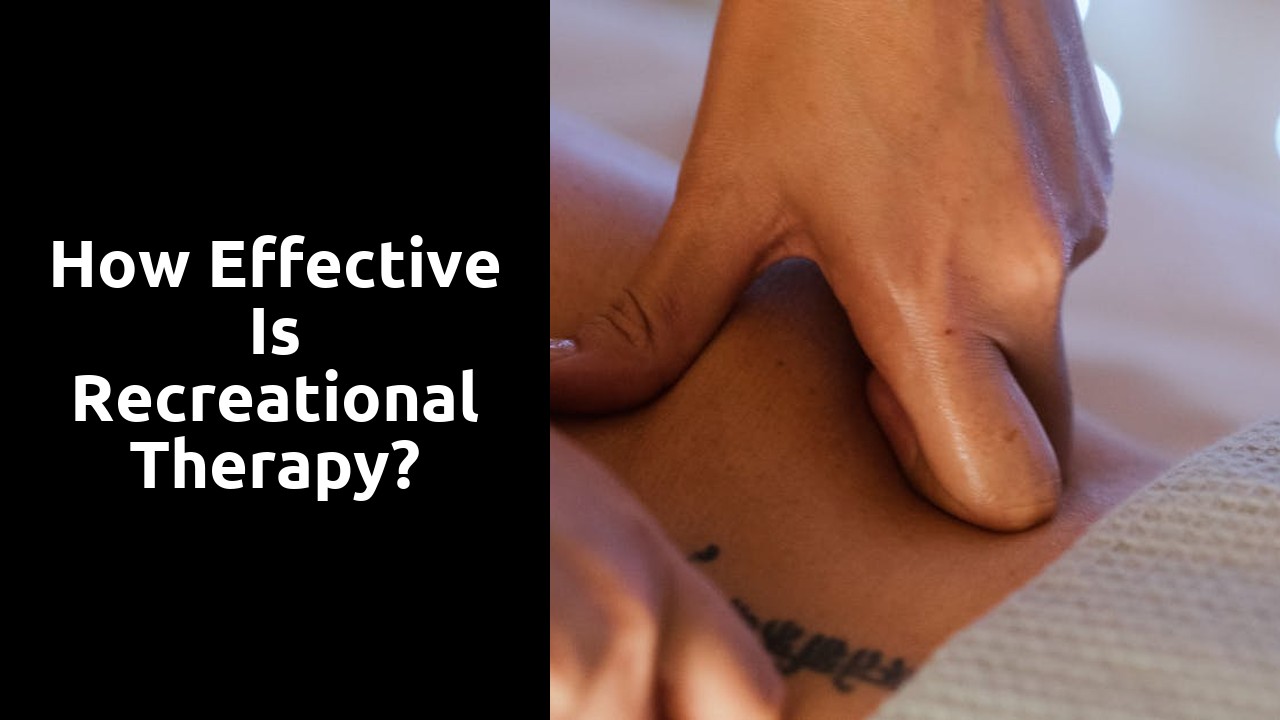How effective is recreational therapy?

Table Of Contents
Recreational Therapy vs. Traditional Therapy
Recreational therapy is a form of therapy that engages individuals in activities such as sports, arts and crafts, and music to address physical, mental, and emotional health challenges. In contrast to traditional therapy methods that mainly focus on talk therapy and medication, recreational therapy emphasizes the importance of using engaging and enjoyable activities to improve overall well-being. This approach can be particularly beneficial for individuals who may struggle to open up in traditional therapy settings or who may find it difficult to express themselves verbally. The hands-on and interactive nature of recreational therapy can foster a sense of achievement, connection, and joy that may not always be achieved through traditional therapy alone.
Contrasting Approaches and Outcomes
When comparing recreational therapy to traditional therapy, it becomes evident that the approaches and outcomes differ significantly. While traditional therapy typically focuses on verbal communication and cognitive processes to address emotional or behavioral issues, recreational therapy utilizes activities to improve physical, emotional, cognitive, and social well-being. The contrasting approaches lie in the utilization of leisure activities and experiential interventions to achieve therapeutic goals in recreational therapy, as opposed to the more verbal and cognitive techniques in traditional therapy.
The outcomes of recreational therapy often include improved physical health, enhanced mood and emotional well-being, increased social engagement, and overall better quality of life. In contrast, traditional therapy primarily aims to address mental health concerns through talk therapy and cognitive strategies. Recreational therapy allows individuals to develop new skills, build self-esteem, and foster a sense of accomplishment through engaging in purposeful leisure activities, leading to holistic improvements in their well-being.
Qualifications of Recreational Therapists
Recreational therapists play a vital role in improving the physical, emotional, and mental well-being of individuals through various recreational activities. To become a qualified recreational therapist, individuals are typically required to hold a bachelor's degree in recreational therapy or a related field. Additionally, many employers prefer candidates who have completed an internship or practicum experience in recreational therapy to gain hands-on knowledge and skills in the field. These experiences provide aspiring recreational therapists with opportunities to work directly with clients and apply theoretical knowledge in real-world settings.
Education and Training Requirements for Practitioners
Education and training requirements for practitioners in recreational therapy vary depending on the specific setting and population being served. At a minimum, a bachelor's degree in recreational therapy or a related field is typically required to become a recreational therapist. Many employers also prefer candidates who have completed an internship or supervised practical experience in a healthcare or recreational therapy setting. Some positions may necessitate a master's degree for advanced roles or leadership positions within the field of recreational therapy. Additionally, many states require licensure or certification to practice as a recreational therapist, which typically involves passing a national certification exam after completing the necessary educational and experiential requirements. These qualifications ensure that practitioners in recreational therapy have the skills and knowledge needed to provide effective and evidence-based interventions to clients who can benefit from recreational therapy services.
Incorporating Recreational Therapy into Treatment Plans
Recreational therapy is increasingly being recognized as a valuable component in treatment plans across various healthcare settings. By incorporating recreational therapy into treatment plans, healthcare providers can enhance the overall well-being and quality of life for their patients. Engaging in recreational activities tailored to individual needs and abilities can promote physical, emotional, and social well-being, complementing traditional medical interventions.
The integration of recreational therapy into treatment plans offers a holistic approach to healthcare that addresses not only the physical symptoms but also the emotional and social aspects of a patient's well-being. By participating in recreational activities under the guidance of trained therapists, individuals can experience improvements in mood, self-esteem, and overall quality of life. The inclusion of recreational therapy in treatment plans highlights the importance of a comprehensive and multifaceted approach to healthcare that takes into account the diverse needs of individuals seeking medical support.
Integrating Recreational Activities with Medical Care
Integrating recreational activities with medical care has shown promising results in enhancing the overall well-being of individuals undergoing treatment. The combination of traditional medical interventions with recreational therapy offers a holistic approach to address physical, emotional, and mental health needs. By incorporating recreational activities such as art therapy, music therapy, or outdoor excursions into treatment plans, patients often experience reduced stress, increased motivation, and improved social interactions.
The multidimensional benefits of recreational therapy in a medical setting highlight the importance of looking beyond conventional treatments. Engaging patients in enjoyable and meaningful activities not only serves as a form of relaxation but also promotes a sense of empowerment and control over their health journey. Integrating recreational therapy into medical care plans recognizes the value of addressing the individual's needs in a comprehensive manner, ultimately contributing to improved patient outcomes and a more positive treatment experience.
FAQS
What is recreational therapy and how does it differ from traditional therapy?
Recreational therapy utilizes recreational activities to improve physical, emotional, cognitive, and social well-being, while traditional therapy focuses more on verbal communication and counseling techniques.
What are the contrasting approaches and outcomes between recreational therapy and traditional therapy?
Recreational therapy focuses on enhancing overall quality of life through enjoyable activities, while traditional therapy typically addresses specific mental health issues through talk therapy and behavioral interventions.
What qualifications do recreational therapists have?
Recreational therapists typically hold a bachelor's degree in recreational therapy or a related field, along with certification from the National Council for Therapeutic Recreation Certification.
What are the education and training requirements for practitioners in the field of recreational therapy?
Practitioners in recreational therapy must complete a supervised internship and pass a certification exam to become a Certified Therapeutic Recreation Specialist (CTRS).
How can recreational therapy be effectively incorporated into treatment plans?
Recreational therapy can be integrated into treatment plans by collaborating with other healthcare professionals to create individualized programs that complement medical care and address specific therapeutic goals."""